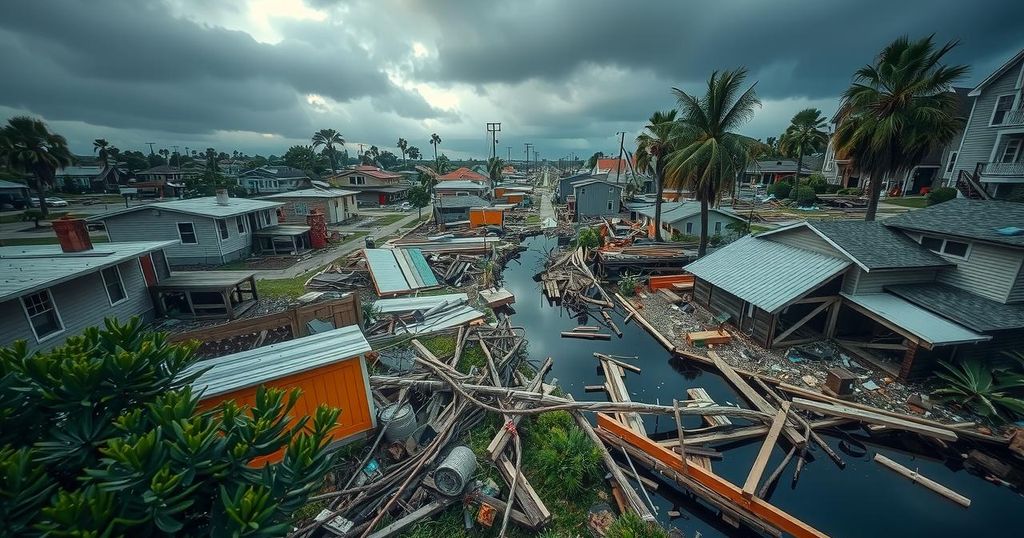Weather
World news
AFRICA, ASHEVILLE, ATLANTIC, BE, BERMUDA, BRIAN MCNOLDY, CARRIACOU, CUBA, DOMINICAN REPUBLIC, EUROPE/ASIA, FLORIDA, GEORGIA, GRENADA, GULF COAST, GULF OF MEXICO, HELENE, HURRICANE, HURRICANE BERYL, HURRICANE SEASON, JAMAICA, KATE, KATRINA, MAINLAND, NATIONAL HURRICANE CENTER, NATURAL DISASTER, NATURAL DISASTERS, NORTH AMERICA, NORTH CAROLINA, OF MIAMI, ORLANDO, RAFAEL, SOUTH AFRICA, SOUTH CAROLINA, TAMPA, TENNESSEE, U. S, U. S. GULF COAST, UNITED STATES, UNIVERSITY, UNIVERSITY OF MIAMI, VIRGINIA
Elena Martinez
0 Comments
2024 Atlantic Hurricane Season Summary: Intensity, Impact, and Climate Change
The 2024 Atlantic hurricane season was marked by 11 hurricanes, significantly higher than the average. Notable storms included Hurricane Beryl, which was the earliest Category 5 storm, and Hurricane Helene, the deadliest since 2005. The season saw devastating impacts, particularly in North Carolina and other southeastern states, due to severe flooding and destruction, highlighting the relationship between climate change and hurricane intensity.
The conclusion of the 2024 Atlantic hurricane season on Saturday has highlighted a remarkable and devastating year, characterized by an unprecedented frequency of hurricane activity. This season witnessed the formation of 11 hurricanes, surpassing the typical average of seven. Among these, eight hurricanes made landfall across various locations, including the U.S. Gulf Coast, Bermuda, Cuba, the Dominican Republic, and Grenada, resulting in significant loss of life and widespread destruction. Meteorologists described this season as “crazy busy,” largely attributed to abnormal ocean temperatures that have fueled hurricane development.
Hurricane Beryl has been notably recognized for being the first Category 4 hurricane recorded to form in June, hitting the island of Carriacou in Grenada, inflicting severe damage and resulting in two fatalities. Notably, Beryl intensified to become the earliest recorded Category 5 hurricane in the Atlantic on July 1st, whereas significant hurricanes typically emerge around September 1st. September brought Hurricane Helene, the deadliest storm to strike the U.S. since Hurricane Katrina in 2005, claiming over 200 lives and causing approximately $48.8 billion in damage, particularly in North Carolina, while other states also faced serious impact.
In October, Hurricane Milton escalated rapidly, reaching top wind speeds of 180 mph, marking it as one of the most powerful hurricanes noted by wind velocity in the Gulf of Mexico, only surpassed by Hurricane Rita in 2005. The rain experienced in regions hit by Helene and Milton was unprecedented, with some areas recording up to three times their usual rainfall for those months. Hurricane Rafael, reaching maximum winds of 120 mph in November, battered Cuba, compounding its struggles following Hurricane Oscar.
The current discussion around hurricane activity and climate change emphasizes the role of greenhouse gases in escalating ocean temperatures. The conditions contributing to hurricane formation have evidently shifted, allowing storms like Beryl and Milton to emerge outside their usual patterns. Brian McNoldy, a hurricane researcher at the University of Miami, stated the unusual timing of these storms illustrates a broader trend linked to climate change. He articulated, “I do not ever point to climate change as causing a specific weather event, but it certainly has its finger on the scale and makes these extreme storms more likely to occur.”
The Atlantic hurricane season, which typically runs from June 1 to November 30, greatly impacts coastal areas each year. The 2024 season has been particularly noteworthy due to the increased frequency and intensity of hurricanes compared to historical averages. The rise in sea temperatures, largely due to climate change, has been associated with higher energy available to fuel hurricanes, leading to unexpected storm development patterns and severe weather events. Understanding these trends is critical not only for immediate safety but also for long-term climate adaptability and mitigation strategies.
The 2024 Atlantic hurricane season has concluded with numerous records and devastating impacts across the U.S. and Caribbean. This season’s activity emphasizes the connection between climate change and hurricane intensity, highlighting the necessity for ongoing climate research and preparation. By examining this season’s storm patterns and effects, it is evident that communities must adapt to an increasing likelihood of extreme weather, addressing both immediate needs and long-term resilience strategies.
Original Source: www.newsday.com




Post Comment